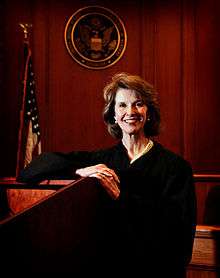Jennifer B. Coffman
| Jennifer Coffman | |
|---|---|
 | |
| Chief Judge of the United States District Court for the Eastern District of Kentucky | |
|
In office 2007–2012 | |
| Preceded by | Joseph Martin Hood |
| Succeeded by | Karen K. Caldwell |
| Judge of the United States District Court for the Eastern District of Kentucky | |
|
In office October 1, 1993 – January 8, 2013 | |
| Appointed by | Bill Clinton |
| Preceded by | Eugene E. Siler, Jr. |
| Succeeded by | vacant |
| Judge of the United States District Court for the Western District of Kentucky | |
|
In office October 1, 1993 – January 8, 2013 | |
| Appointed by | Bill Clinton |
| Preceded by | Eugene E. Siler, Jr. |
| Succeeded by | vacant |
| Personal details | |
| Born |
1948 (age 67–68) Union City, Tennessee, U.S. |
| Alma mater |
University of Kentucky University of Kentucky College of Law |
Jennifer B. Coffman (born 1948) is a former United States federal judge.
Born in Union City, Tennessee, Coffman received a B.A. from the University of Kentucky in 1969, a M.S. from the same institution in 1971, and a J.D. from the University of Kentucky College of Law in 1978. She was in private practice in Lexington, Kentucky from 1977 to 1993, also teaching as an adjunct instructor at the University of Kentucky College of Law from 1979 to 1981.
On August 6, 1993, Coffman was nominated by President Bill Clinton to a joint appointment to both the United States District Court for the Eastern District of Kentucky, on which she has served as the Chief Judge since 2007, and also for the United States District Court for the Western District of Kentucky, both vacated by Eugene E. Siler, Jr.. She was confirmed by the United States Senate on September 30, 1993, and received her commission on October 1, 1993. She simultaneously served a 2011-2018 term on the secret FISA Court until retiring early, effective on January 8, 2013, from both courts.[1] She was the first female judge appointed to the Federal courts in Kentucky.[2]
In 2013, following the gay rights decisions in Hollingsworth v. Perry and United States v. Windsor, Kentucky circuit court Judge Tim Philpot wrote an Op-Ed titled "Rulings do not change Ky. law on gay marriage."[3] Coffman wrote an Op-Ed in response, highly critical of Philpot's judgement in writing the piece and declaring that he had risked his judicial integrity and concluded that "Philpot might have foreclosed his ability to sit on any case involving gay marriage because his comments raise a question of bias on the topic of sexual orientation."[4] Coffman also criticised Philpot for dismissing principles of judicial interpretation as "boring and technical" and for ridiculing judicial review with his observation that then-Chief Judge of the United States District Court for the Northern District of California Vaughn Walker's declaration that Proposition 8 was unconstitutional was: "One trial judge trumped every voter in California."[3][2] – and for gratuitously mentioning Walker's sexuality.[4]
Sources
- ↑ "The Foreign Intelligence Surveillance Court: 2013 Membership". Federation of American Scientists. Retrieved June 9, 2013.
- 1 2 Lat, David (August 12, 2013). "Benchslap Of The Day: Federal Judge Tells State Judge To Shut His Mouth". Above the Law. Retrieved October 3, 2016.
- 1 2 Philpot, Tim (July 29, 2013). "Rulings do not change Ky. law on gay marriage". Lexington Herald Leader. Retrieved October 3, 2016.
- 1 2 Coffman, Jennifer (August 12, 2013). "There's a reason justice is blind, silent". Lexington Herald Leader. Retrieved October 3, 2016.
| Legal offices | ||
|---|---|---|
| Preceded by Joseph Martin Hood |
Chief Judge of the United States District Court for the Eastern District of Kentucky 2007–2012 |
Succeeded by Karen K. Caldwell |
| Preceded by Eugene E. Siler, Jr. |
Judge of the United States District Court for the Eastern District of Kentucky 1993–2013 |
Vacant |
| Preceded by Eugene E. Siler, Jr. |
Judge of the United States District Court for the Western District of Kentucky 1993–2013 | |
- Jennifer B. Coffman at the Biographical Directory of Federal Judges, a public domain publication of the Federal Judicial Center.